- Serbia
Get to know Serbia
- Citizens
Culture and science
Health services
Pension and disability insurance
- Business
Employment
Economy
- Media
- Government
- Contact
Keep in touch
Contact form
Back
Keepin touch
Whether you have a question, comment, suggestion or any problem in the purview of the government, send us your message and we will try to respond as soon as possible. If your problem is not in our purview, we will forward your message to the relevant institution.
Q:
A:
Territorial status quo for this part of Europe
Belgrade,
1 June 2004
There can be no lasting peace in Kosovo without a solution satisfactory to both parties, said Political Advisor to the Serbian Prime Minister Slobodan Samardzic, adding that if Kosovo is not multiethnic, "the Albanians will not have peace with their neighbours".
Speaking at a lecture themed "Kosovo-Metohija - multiethnic or independent", organised by the Serbian-American Centre, Samardzic said that it is necessary to do four things so that the problem of Serbia's southern province could be solved.
First, the discussions on Kosovo's final status should be stopped, because conditions for that have still not been created. Second, the territorial status quo should be declared in this part of Europe. Third, a suitable mechanism of protection of Serbs should be established, and fourth, the question of the final status should be linked to the quality of internal relations in the province.
"The problem of Kosovo could perhaps be solved with independence if Kosovo were ruled by democracy, but that would encourage other communities to demand the same. That would change relations in the region and set off a chain reaction difficult to control," said Samardzic.
Samardzic said that at this moment, there are several solutions to the Kosovo problem in the world.
The first is the US solution, presented by experts such as Morton Abramovic, Ted Carpenter and Martin Shlezinger, and that is the division of Kosovo. Samardzic said that that would also set off a chain reaction, because ethnic Albanians would want the same in Macedonia.
The second solution is the Council of Europe's idea of the province's decentralisation, which is closest to the Serbian government's Plan for Kosovo-Metohija. However, that solution does not envisage the regional level of decentralisation, Samardzic said, and compared it to "treating a seriously ill person with an aspirin".
The third solution is similar to the Ochrid Agreement which in 2001 ended the conflicts between Macedonians and ethnic Albanians. Leader of the Democratic Party of Kosovo Hasim Thaci also proposed that solution at a recent meeting in Lucerne.
The fourth solution is that the European Union take over the mandate for the civil mission in Kosovo from the United Nations and the OSCE. According to Samardzic, that would be no different from the present state of affairs.
Samardzic said that the events of March 17 and 18 made the international community admit that ethnic cleansing is taking place in Kosovo. Since than, "things are starting to develop more quickly, the real state of affairs is getting to be accepted, but there is still no clear strategy for the solution to the problem".
First, the discussions on Kosovo's final status should be stopped, because conditions for that have still not been created. Second, the territorial status quo should be declared in this part of Europe. Third, a suitable mechanism of protection of Serbs should be established, and fourth, the question of the final status should be linked to the quality of internal relations in the province.
"The problem of Kosovo could perhaps be solved with independence if Kosovo were ruled by democracy, but that would encourage other communities to demand the same. That would change relations in the region and set off a chain reaction difficult to control," said Samardzic.
Samardzic said that at this moment, there are several solutions to the Kosovo problem in the world.
The first is the US solution, presented by experts such as Morton Abramovic, Ted Carpenter and Martin Shlezinger, and that is the division of Kosovo. Samardzic said that that would also set off a chain reaction, because ethnic Albanians would want the same in Macedonia.
The second solution is the Council of Europe's idea of the province's decentralisation, which is closest to the Serbian government's Plan for Kosovo-Metohija. However, that solution does not envisage the regional level of decentralisation, Samardzic said, and compared it to "treating a seriously ill person with an aspirin".
The third solution is similar to the Ochrid Agreement which in 2001 ended the conflicts between Macedonians and ethnic Albanians. Leader of the Democratic Party of Kosovo Hasim Thaci also proposed that solution at a recent meeting in Lucerne.
The fourth solution is that the European Union take over the mandate for the civil mission in Kosovo from the United Nations and the OSCE. According to Samardzic, that would be no different from the present state of affairs.
Samardzic said that the events of March 17 and 18 made the international community admit that ethnic cleansing is taking place in Kosovo. Since than, "things are starting to develop more quickly, the real state of affairs is getting to be accepted, but there is still no clear strategy for the solution to the problem".
-
 Belgrade, 1 March 2026
Belgrade, 1 March 2026Five Serbs from village of Suvo Grlo near Srbica in Kosovo and Metohija detained
-
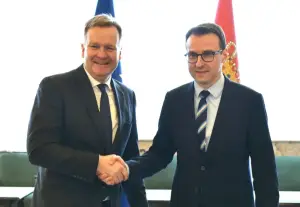 Belgrade, 25 February 2026
Belgrade, 25 February 2026Priština endangers survival of Serbs in Kosovo and Metohija with escalatory moves
-
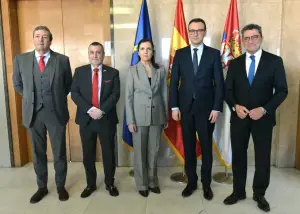 Belgrade, 12 February 2026
Belgrade, 12 February 2026Gratitude to Spain for consistent support on Kosovo and Metohija issue
-
 Belgrade, 10 February 2026
Belgrade, 10 February 2026Belgrade seeks urgent EU response over pressures on Serbian institutions in Kosovo and Metohija
-
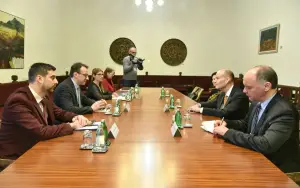 Belgrade, 5 February 2026
Belgrade, 5 February 2026UNMIK’s greater visibility, presence needed on ground
-
 Belgrade/Brussels, 22 January 2026
Belgrade/Brussels, 22 January 2026Accelerate resolution of issue of missing persons
-
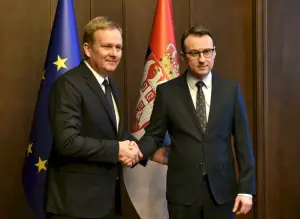 Belgrade, 16 January 2026
Belgrade, 16 January 2026Concrete steps needed to establish Community of Serb Municipalities
-
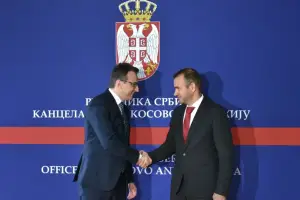 Belgrade, 11 December 2025
Belgrade, 11 December 2025Belgrade firmly committed to peace, stability in region
-
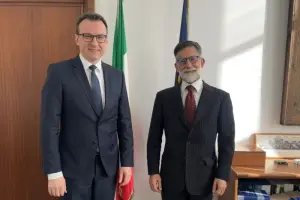 Belgrade/Rome, 10 December 2025
Belgrade/Rome, 10 December 2025Belgrade doing everything to preserve peace, stability in Kosovo and Metohija


